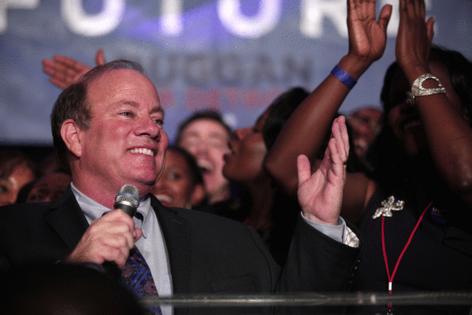Detroit think tank on city's future: 'We are at a turning point'
Published in News & Features
DETROIT — A Detroit think tank says the city's next mayor needs to prioritize rebuilding the city's middle class, create more generational wealth opportunities for Detroiters, and invest in climate-resilient infrastructure.
The Detroit Future City's “Opportunities for the Next Mayoral Administration to Grow Detroit’s Middle Class” policy brief, released Thursday, is what the think tank describes as "a policy roadmap" for the next mayor. It's also intended for voters to help them decide which candidate is best qualified to continue the city's momentum.
“Detroit has made great strides over the last decade, but we are at a turning point,” said Anika Goss, CEO of Detroit Future City.
The report comes as Detroiters are gearing up to elect a new mayor this fall for the first time in more than a decade. Three-term Mayor Mike Duggan announced late last year that he would not seek a fourth term and plans to run for governor.
Duggan is widely credited for playing a key role in stabilizing the city as it emerged from the largest municipal bankruptcy in the country. He leaves office as the city has halted its decades-long trends of hemorrhaging population. Tens of thousands of blighted properties have also been removed, and the city government has had a balanced budget for 12 consecutive years.
"I think the blueprint that the Duggan administration has used over the last 10 years is what got us here. Our point is that we can't afford to lose any momentum," Goss said. "The next phase... would be, how do we grow Detroit's middle class and make sure that Detroiters are looking to Detroit as a place to live when they want to grow their own income and grow their own business."
A previous Detroit Future City report released in September found the city has had only 12 middle-class neighborhoods, out of the city's more than 200 neighborhoods, for the past 10 years.
"Even if we just move up by two, it would have a significant difference. That would be a really big deal," Goss said.
The think tank defined the city's middle-class neighborhoods as census tracts where more than 50% of households are middle or upper middle class. In 2012, 40% of the census tracts in the city fell into this category, and by 2022, this had declined to 31% of census tracts, according to the September report.
Increasing middle-class neighborhoods, creating more opportunities for Detroit to pass on wealth for future generations and improving the city's infrastructure should be major priorities for the city's future administration and residents. The policy brief gives specific policies and strategies for each of the goals.
It's a crowded field of candidates who to want to be Detroit's next mayor, which include former Detroit Police Chief James Craig; Detroit City Council President Mary Sheffield; former Council President Saunteel Jenkins; Councilman Fred Durhall III; and the Rev. Solomon Kinloch.
Goss said many candidates are addressing the issues "at a very high level." She hopes the report helps candidates and voters "narrow in on what the specific things" need to be done to achieve the goals.
"This brief is somewhat for the candidates to become much more laser-focused on their priority issues. But more so it's for Detroiters to be able to ask hard questions," Goss said. "As a Detroiter, you want to know what these candidates plan on doing about these specific issues."
The August primary will narrow down the candidates to the top two vote-getters, who would then face off in the general election in November.
©2025 The Detroit News. Visit detroitnews.com. Distributed by Tribune Content Agency, LLC.







Comments